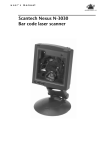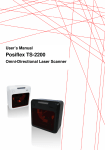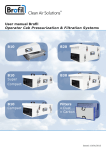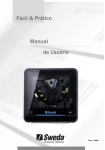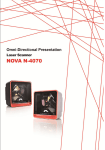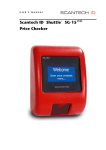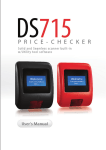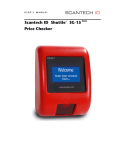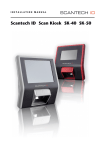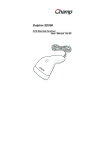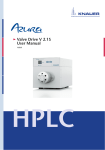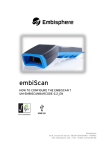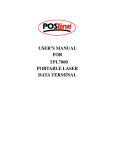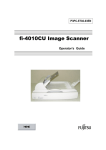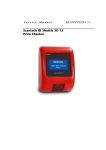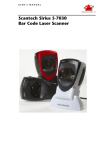Download User Manual
Transcript
User’s
Manual
Scantech ID Shuttle SG-15
Price Checker
User’s Installation and Configuration Manual
Scantech-ID Shuttle SG-15
Copyright © 2006, Scantech-ID BV.
This manual is copyrighted, with all rights reserved. Under the copyright laws, this manual may not, in
whole or in part, be copied, photocopied, reproduced, translated or converted to any electronic medium or
machine readable form without prior written consent of Scantech-ID BV.
Limited Warranty
Under all circumstances this manual should be read attentively, before installing and/or using the product.
In no event shall Scantech-ID BV be liable for any direct, indirect, special, consequential or incidental
damages arising out of the use or inability to use this documentation or product, even if advised of the
possibility of such damages. In particular, Scantech-ID BV shall not be liable for any hardware, software, or
data that is stored or used with the product, including the cost of repairing, replacing or recovering the
above. Scantech-ID BV reserves the right to change parts of the device at any time without preceding or
direct announcement to the client.
Scantech-ID BV reserves the right to revise this manual, and to make changes in the contents without
obligation to notify any person or entity of the revision or change. A serial number appears on the product.
Make sure that this official registration number has not been removed. It should be used whenever
servicing by Scantech-ID BV or an authorised Scantech dealer is necessary.
Important
This equipment has been tested and found to comply with the limits for a Class B digital device, pursuant to
EN55022, and with the limits for a class A digital device, pursuant to part 15 of the FCC rules. These limits
are designed to provide reasonable protection against harmful interference when the equipment is operated
in a commercial environment. This equipment generates, uses, and can radiate radio frequency energy
and, if not installed and used in accordance with the user’s manual, may cause harmful interference to radio
communications. Operation of the equipment in a residential area is likely to cause harmful interference in
which case the user will be required to correct the interference at his own expense. Any unauthorised
changes or modifications to this equipment could void the user’s authority to operate this equipment.
-
The Shuttle is in conformity with the CE standards. Please note that a Scantech CE-marked power
supply unit should be used to conform to these standards.
Radio and television interference
Operation of this equipment in a residential area can cause interference with radio or television reception.
This can be determined by turning the equipment off and on. The user is encouraged to try to correct the
interference by one or more of the following measures:
• Re-orientate the receiving antenna
• Relocate the devices with respect to the receiver
• Move the device away from the receiver
• Plug the device into a different outlet in order to have the device and receiver on
different branch circuits
If necessary, the user should consult the manufacturer, an authorised Scantech dealer or experienced
radio/television technician for additional suggestions. The booklet "How to Identify and Resolve Radio-TV
Interference Problems", prepared by the Federal Communications Commission, can be of help. It can be
obtained from the U.S. Government Printing Office, Washington, DC 20402, Stock No. 004000003454.
P/N A372001 V1.5 October 2006
1
Table of contents
Table of contents ......................................................................................... 1
Preface
................................................................................................. 3
Chapter 1 Product Safety ........................................................................... 5
1.1
Used conventions ............................................................. 6
1.2
Laser safety..................................................................... 6
1.3
Declaration of Conformity ................................................. 9
1.4
Scanner Labelling........................................................... 10
Chapter 2 General Description .................................................................. 11
2.1
Use of the Shuttle SG-15................................................. 12
2.2
Construction of the Shuttle SG-15.................................... 13
2.3
Functioning of the Shuttle SG-15...................................... 14
2.4
Power Over Ethernet (PoE) .............................................. 16
Chapter 3 Installation of the Shuttle SG-15 ................................................. 17
3.1
Unpacking ..................................................................... 18
3.2
mounting ....................................................................... 18
Chapter 4 System Integration.................................................................... 21
4.1
Software........................................................................ 22
4.2
How to communicate? A Simple example.......................... 25
Chapter 5 Configuring the Shuttle .............................................................. 27
5.1
Preface ......................................................................... 28
5.2
Starting the configuration................................................ 30
Preface
2
5.3
Configuration tool network settings .................................. 32
5.4
Scanning the network...................................................... 33
5.5
Configuring the SG-15 ..................................................... 34
5.6
Network configuration ..................................................... 37
5.7
Wireless configuration ..................................................... 38
5.8
Modifying internal messages............................................ 39
5.9
Miscellaneous settings .................................................... 41
5.10
Cloning settings............................................................. 42
Chapter 6 Maintaining the Shuttle............................................................... 43
6.1
Cleaning......................................................................... 44
Appendices ................................................................................................ 45
A
Connector types and pin definitions .................................. 47
B
Controlling the display and shuttle terminal ....................... 49
C
Character sets................................................................ 55
D
Factory Default Settings .................................................. 57
E
Upgrading Firmware........................................................ 59
F
Barcode set up (omni directional scanner) ........................ 61
G
Frequently Asked Questions............................................. 67
H
Shuttle Project tasks ....................................................... 71
I
Technical specifications................................................... 73
J
Overview Partnumbers .................................................... 75
K
SHuttle Sg-15 Demonstration program ............................. 77
L
802.11B PCMCIA cards .................................................. 79
M
LEDS and jumpers .......................................................... 81
Preface
The Shuttle SG-15 is an entry level, small and attractive price checker.
The Shuttle features the latest technology. Interfacing is either through Wireless
RF or hard wired Ethernet. The bright display has, depending on the font set, 3
or 5 lines and can display up to 20 characters per line. There is a choice of bar
code scanners between the low cost single scan line CCD scanner or the high
performance 20 scan lines laser scanner.
Because of its size and the sympathetic good looks the Shuttle can be installed
anywhere in a store, including on the shelves. This flexibility of installation is
enhanced by the optional Power-over-Ethernet. The three available standard
colours also greatly help to fit most interiors.
General Information
The Scantech-ID Shuttle SG-15 is the latest product developed by the company
that has more than 10 years of experience in the field of customer information
systems. Today we offer a choice of scanner (CCD single line or laser 20 omni
directional lines), a choice of colour (Silver, Black or Red) and a choice of
interface (WiFi or LAN).
Quality and Durability
The Shuttle comes with the same top quality as all other Scantech-ID products.
So at a very competitive price the same quality and performance of more
expensive products is available. Due to the high MTBF times of every component
a long and service free operation time is secured.
Flexibility
The size of 183mm (height), 132mm (width) and 95mm (depth), makes the
Scantech-ID Shuttle small enough to be installed in larger numbers per store.
Even when mounted on a shelf it will not block products on display. The bright
display makes it easy to read prices and product information.
Connectivity
The Shuttle comes standard with the a MS-Windows Configuration Tool.
A customized application program, not supplied by Scantech-ID, is necessary for
retailers to operate the SG-15 in their specific environment. Scantech supplies
software source code examples plus Ethernet drivers for easy integration.
Preface
4
5
Chapter 1 Product Safety
6
1.1
Product Safety
USED CONVENTIONS
In this manual the following conventions are used:
ATTENTION
Gives a tip, an instruction or a point of attention.
IMPORTANT
Warns for possible damage to the scanner or other objects when
not following an instruction.
DANGER!
Warns for possible harm to persons when not following an
instruction.
1.2
LASER SAFETY
ATTENTION
During installing, always follow the, instructions.
DANGER!
Do not stare into the laser beam. The laser safety is in conformity
with IEC 825 and 21CFR140.
Scantech-ID Shuttle SG-15
7
German:
Der Strichcode-Scanner SHUTTLE entspricht den Sicherheitsvorschriften nach IEC 825-1 (1993) für
ein Laserprodukt der Klasse I. Er entspricht auch U.S. 21CFR1040, anwendbar auf ein Laserprodukt
der Klasse IIa. Vermeiden Sie langzeitiges Hineinblicken in direktes Laserlicht.
Dutch:
De SHUTTLE scanner voldoet aan de veiligheidsnormen IEC 825-1 (1993) voor een Klasse I
laserproduct. Tevens voldoet de scanner aan U.S. 21CFR1040, van toepassing op een Klasse IIa
laserproduct. Vermijd langdurig kijken in direct laserlicht.
French:
Le scanner SHUTTLE est conforme aux normes de sécurité IEC 825-1 (1993) s’appliquant à un produit
laser de la classe I. Il est également conforme à la U.S. 21CFR1040 telle qu’elle s’applique à un
produit laser de la classe IIa. Eviter de rester exposé longtemps à la lumière directe du laser.
Danish:
SHUTTLE skanneren er i overensstemmelse med sikkerhedsstandarden IEC 825-1 (1993) for
laserprodukter i klasse I. Den er også i overensstemmelse med U.S. 21CFR1040, der gælder for
laserprodukter i klasse IIa. Undgå at se direkte på laserlys i længere perioder..
Finnish:
SHUTTLE-skanneri täyttää luokan I lasertuotteelle IEC 825-1:ssä (1993) asetetut turvavaatimukset. Se
täyttää myös U.S. 21CFR1040:ssa asetetut vaatimukset siltä osin kuin ne koskevat luokan IIa
lasertuotetta. Vältä pitkäaikaista suoraan laservaloon katsomista.
Swedish:
Avsökaren SHUTTLE uppfyller säkerhetsnormen IEC 825-1 (1993) för laserprodukter av klass 1. Den
uppfyller dessutom U.S. 21CFR1040 som gäller för laserprodukter av klass IIa. Undvik att titta i direkt
laserljus under längre perioder.
Norwegian:
SHUTTLE skanneren er i samsvar med sikkerhetsstandarden IEC 825-1 (1993) for laserprodukter i
klasse I. Den er også i samvar med U.S. 21CFR1040 for laserprodukter i klasse IIa. Unngå å se
langvarig på direkte laserlys.
Italian:
Lo scanner SHUTTLE è conforme alle norme di sicurezza IEC 825-1 (1993) relative ad un prodotto
laser di Classe 1. È inoltre conforme alla norma U.S. 21CFR1040 relativa ad un prodotto laser di
Classe IIa. Evitare l'esposizione prolungata all'emissione diretta di luce laser.
Portuguese:
O scanner SHUTTLE está conforme as normas de segurança IEC 825-1 (1993) para a Classe 1 dos
produtos laser. Também está conforme a norma U.S. 21CFR1040 aplicada nos produtos laser da
Classe IIa. Evite expor os olhos directa e prolongadamente aos raios laser.
8
Product Safety
Spanish:
El scanner SHUTTLE reune las normas de seguridad IEC 825-1 (1993) para un producto laser de
Clase 1. Y también reune las normas U.S. 21CFR1040 que se aplican a un producto laser de Clase
IIa. Se debe evitar mirar muy fijo en luz lasérica directa.
English:
The SHUTTLE scanner complies with safety standard IEC 825-1 (1993) for a Class I laser product. It
also complies with U.S. 21CFR1040 as applicable to a Class IIa laser product. Avoid long term viewing
of direct laser light.
Optical:
The use of optical instruments with this product will increase eye hazard. Optical instruments include
binoculars, microscopes and magnifying glasses but do not include eyeglasses worn by the user.
Radiant Energy:
The SHUTTLE uses a low-power laser diode operating at 630…670 nm in an opto-mechanical scanner
resulting in less than 0.6 mW peak output power. Laser light observed at 13 cm (5.1 in.) above the
window through a 7 mm (0.28 in.) aperture and averaged over 1000 seconds is less than 3.9 µW per
CDRH Class IIa specification. Do not attempt to remove the protective housing of the scanner, as
unscanned laser light with a peak output up to 0.8 mW could be accessible inside.
Laser Light Viewer:
The scanner window is the only aperture through which laser light may be observed on this product.
A failure of the scanner motor, while the laser diode continues to emit a laser beam, may cause
emission levels to exceed those for safe operation. The scanner has safeguards to prevent this
occurrence. If, however, a stationary laser beam is emitted, the failing scanner should be
disconnected from its power source immediately.
Adjustments:
Do not attempt any adjustments to or alteration of this product. Do not remove the scanner’s
protective housing. There are no user-serviceable parts inside.
CAUTION
Use of controls or adjustments or performance of procedures other
than those specified herein may result in hazardous laser light
exposure.
Scantech-ID Shuttle SG-15
1.3
DECLARATION OF CONFORMITY
9
10
1.4
Product Safety
SCANNER LABELLING
11
Chapter 2 General Description
12
2.1
General Description
USE OF THE SHUTTLE SG-15
The Shuttle is a Price Checker, which provides the user with the opportunity to
scan their chosen product and display product information or verify the price
before getting to the checkout. Apart from this, the Shuttle offers the ability to
interface with loyalty cards, display special offers, display dual currency, etc.
Moreover, store level profitability can be increased.
Apart from the use as an advanced pricechecker, the Shuttle can also be used in
many other environments where identification and information is required. This
includes use with ticketing, access control, time check, route and place guidance,
etc.
Scantech-ID Shuttle SG-15
2.2
13
CONSTRUCTION OF THE SHUTTLE SG-15
The various parts of the Shuttle are indicated in figure 2.1:
A. Cover with window
B. LCD
The display size is 128x64 pixels
The display features white characters on a blue backlight background
C. Scantech scanner or CCD line scanner
D. Mount scanner
E. Main board, PoE add-on PCB (optional) or PCMCIA card (optional)
F.
PCB Protection
G. Backplate
F
E
B
D
C
A
Fig 2.1
G
14
General Description
2.3
FUNCTIONING OF THE SHUTTLE SG-15
2.3.1
Introduction
The Shuttle is an information terminal, which receives input (barcode), from a user
and answers via the display. The display contents is provided by a computer
application, which runs on a (server) system elsewhere.
2.3.2
Input
The main input can generated by the integrated Scantech barcode reader (which
is characterised by a high performance 20 scan lines laser scanner), or with a
CCD single line scanner.
2.3.3
Output
Based on the input and the application software on the host-system the Shuttle
communicates with the user via text on the screen and optional a beep via the
beeper.
Scantech-ID Shuttle SG-15
2.3.4
15
Software & Control
The functions during daily use of the Shuttle are determined by the application
program, which is controlling the Shuttle. So the task of the storage of
databases, providing the information and sending it to the display of the Shuttle
will be performed by a central host system.
Providing this application, running on the host system, is the responsibility of the
System Integrator!
Shuttle
Host
barcode
Database
barcode
Application
(by System
Integrator)
Product and
graphical info
Product
info
The SG-15 sends barcodes to the host, according to the following table:
CODE
MESSAGE FORMAT
EAN 13
F
D1 D2 D3 D4 D5 D6 D7 D8 D9 D10 D11 D12 D13
[CR]
EAN 8
FF
D1 D2 D3 D4 D5 D6 D7 D8
[CR]
UPC A
A
D1 D2 D3 D4 D5 D6 D7 D8 D9 D10 D11 D12
[CR]
UPC E
E
Ø D1 D2 D3 D4 D5 D6
[CR]
ITF
i
D1 - Dx
[CR]
Code 39 *
D1 - Dx
[CR]
Code 32 *
D1 - Dx
[CR]
Codabar %
D1 - Dx
[CR]
Code128 #
D1 - Dx
[CR]
EAN 128 P
]C1 D1 - Dx
[CR]
Note: The message format is bar code programmable with the Scantech Configuration Guide.
The Shuttle documentation and the demo/set-up programs provide you with you
all the required information on how to communicate with the Shuttle and how to
control it. The SG-15 Product Support CD contains all kind of source code
examples and as of version 1.3 a complete example for application software,
including an Ethernet driver to enable the integrator to get the SG-15 up and
running in no time.
16
2.4
General Description
POWER OVER ETHERNET (POE)
The alternative for powering the SG-15 Shuttle through an external PSU (adapter),
is using the Power-Over-Ethernet (PoE) version of the SG-15.
In this way the SG-15 is powered directly through the Ethernet and you don’t need
to install a (230/110VAC) mains socket anymore somewhere in the middle of the
store, so in this way saving you quite some installation costs!
The SG-15 Shuttle PoE complies with the official standard: IEEE 802.3af.
For your information:
PoE uses either the 4 Ethernet data lines (pin 1,2,3,6), called End-Span, or the
not used Ethernet lines (pin 4,5,7,8), called Mid-Span, to transport the DC voltage
to the SG-15. Which method is used, depends on the supplying powered network
switch (hub). The Shuttle SG-15 supports both methods automatically. See also
Appendix A.
Towards the host-side, this means that you need a special hub/router which
supports the Power-Over-Ethernet (PoE) feature following the official standard for
this: IEEE 802.3af.
To avoid any miscommunication in this area: Scantech does not supply
network components like a power injector, network cabling, powered
hubs etc.
When we ship the first SG-15’s PoE in the current stage, this is in most cases for
demo- or evaluation purposes. Therefore we DO include the standard PSU. This is
done ‘just to be sure’ and to give our customers the possibility to at least turn-on
the SG-15 independent from the hub, for instance for SG-15 configuration
purposes.
Of course, for the real installation in the store (roll-out), with the SG-15 connected
to a hub with Power-Over-Ethernet IEEE 802.3af, you do not need the mains PSU
(adapter).
In case a project roll-out starts, we will not include the mains PSU anymore.
Physically (i.e. inside the SG-15) this means that we place a special PoE board to
support the PoE feature. See Appendix J for SG-15 POE Partnumbers.
Scantech-ID Shuttle SG-15
Chapter 3 Installation of the Shuttle SG-15
17
18
3.1
Installation
UNPACKING
Unpack the Shuttle as follows:
1. Take the Shuttle and its accessories out of the box.
2. Remove the packing material.
3. Check the packing list to make sure you have received all of the items
ordered.
4. Visually inspect the Shuttle and accessories for any evidence of physical
damage.
5. If anything is missing or appears to be damaged, immediately contact your
dealer.
ATTENTION
Store the packing material and boxes: it should be used whenever
the Shuttle is transported for servicing.
3.2
MOUNTING
Once you have unpacked all components, you can start installing the Shuttle.
Installing the Shuttle is divided in two steps:
1. Mounting the Shuttle to the wall.
2. Installation is discussed in detail on the following page.
Scantech-ID Shuttle SG-15
19
82
B
A
70
A
fig 3.1
ATTENTION
Mount the Shuttle on a convenient height.
1. Mark the locations for the mounting holes on the wall and drill two
holes.
2. Put plugs in the holes.
3. Connect the power cable and the communication cable of the
Shuttle (see figure 3.1 above).
4. Fasten the Shuttle to the wall by clicking it on the 2 screws
(parkers, indicated by A).
5. If necessary, adjust the contrast of the display by trimming the
regulator through the small hole on the side, with a small
screwdriver (indicated by B).
20
Installation
Scantech-ID Shuttle SG-15
Chapter 4 System Integration
21
22
4.1
System Integration
SOFTWARE
The Shuttle SG-15 is a thin-client, front-end Price Checker. Its behavior is very
easily configurable and fully determined by the software package, driving the
Shuttle from the Back-Office/server. This software package (or: added value) will
be supplied by the System Integrator. This is given the fact that there are no set
international standards with regard to product database structures and/or
programming languages. Furthermore it is not Scantech´s primary role to supply
end-user application software.
ATTENTION
As of version V1.3, the SG-15 Product Support CD contains the
SG-Net Ethernet driver.
This driver, which includes an extensive demo application (with
source code), makes it very easy to create a server application in
no time at all.
These objects are available for both Windows and Linux
4.1.1
Software functionality
The global function of the Shuttle software package, running on the
Back-Office/server, is:
1. Set-up and maintain communication between the application itself and the
Shuttle terminal(s).
2. Provide product information (e.g. article name and price) from the store’s
database, combined with the right fontsize and layout.
3. Diagnostics & Terminal Statistics (optional).
Scantech-ID Shuttle SG-15
4.1.2
23
Scantech Tools and Drivers
In order to support our System Integrators in the best possible way, Scantech ID
supplies:
1. Extensive documentation describing all details of the product.
(this manual and more).
2. Configuration utility: See chapter 5.
Scantech ID provides this Configuration Tool, which only runs under Microsoft
Windows (all versions). This tool makes it possible to configure an SG-15
anywhere in the network, having any possible IP-Address.
ATTENTION
As of firmware version V1.00, the SG-15 runs an embedded web
server for configuration purposes. This makes it possible to
configure an SG-15 with any internet browser, using any operating
system, without the need of a dedicated configuration utility.
3. Examples of source code: See CD-ROM \Source Code Examples.
All these items can be found on the Shuttle Product Support CD-ROM.
24
4.1.3
System Integration
Compatibility
The SG-15 is a basic Price Checker, so it does not require a very advanced and
extensive set of commands to control it, comparing it to our other model(s). In
other words: The SG-15 is not backwards compatible with the SG-20.
The main reasons for this are:
1. The difference in layout of the SG-15 display: 5 lines when using the small
font type or 3 lines using the large font type.
2. To improve the readability of the display, a proportional font type is used,
instead of a font type with a fixed character width. About 20 characters per
line (max).
In case you already created an SG-20 application in the past, you only need to
make a few minor changes in order to integrate the SG-15 Shuttle; The SG-15
uses the same command structure as the SG-20 (using ASCII data and ESC
codes).
Scantech-ID Shuttle SG-15
4.2
25
HOW TO COMMUNICATE? A SIMPLE EXAMPLE
The SG-15 is a simple IP device in the local network, which accepts and displays
normal ASCII characters.
After scanning a bar code, it outputs it as a normal ASCII string.
The easiest way to communicate with an SG-15 right out of the box, without any
further configuration, is using a telnet session:
1
First, connect the SG-15 to your network (using a normal 1:1
Ethernet cable) or directly to your PC (using a crossed Ethernet
cable).
2
As you turn on the SG-15, the 'Offline' message will flash on the
display. It will continue to do so, until you've made a software
connection to it.
3
By default, the SG-15 is configured as TCP Server, having the
IP address 192.168.3.227 and listening to port 9101.
4
Make sure that your PC has an IP address in the same IP range, e.g.
192.168.3.1.
5
You should be able to 'ping' the SG-15 now, by entering:
ping 192.168.3.227
If it's not successful, you should double check the IP address of
your PC and all cable connections.
Also, make sure the SG15 is configured to it's default settings. You
can force this by placing jumper #1 and reboot the SG-15 (see also
appendix D).
26
6
System Integration
You need a client program to connect to the SG-15.
The widely used 'telnet' program is such a program.
You can connect to the SG-15 by entering:
telnet 192.168.3.227 9101
As a result, the 'Offline' message on the SG-15 should disappear.
7
Now you can enter characters on your keyboard, which should
appear on the SG-15's display.
Also, when you scan a barcode with the SG-15, it should appear on
your monitor.
8.
See appendix B for how to do more on the SG15's display.
Some notes:
1. Regarding the Network Connection Properties of your PC:
You may have to turn OFF DHCP and make sure the IP address of your PC
is in the same IP range as the Shuttle you want to communicate with.
For instance by giving your PC IP address: 192.168.3.1
2. If you have a firewall running on your PC, make sure it's not blocking the
communication in any way.
Scantech-ID Shuttle SG-15
Chapter 5 Configuring the Shuttle
27
28
5.1
Configuring the Shuttle
PREFACE
There are two methods to configure a Shuttle:
1.
Using a web browser (Shuttle Firmware V1.00 or higher is needed).
As of firmware V1.00, the SG-15 has an internal web server
for configuration purposes. This eliminates the need for a dedicated
configuration tool and makes it possible to configure a Shuttle
independent of the operating system on your system.
Just start any web browser and enter the IP-address of your Shuttle.
2.
Using the Configuration Tool, supplied by Scantech ID.
Scantech ID provides this Configuration Tool, to be able to configure a
Shuttle anywhere in the network, having any possible IP-Address.
The Shuttle uses a special package format, communicating through UDP,
for it's configuration. This utility makes use of this format. (The recordlayout can be made available to customers to write their own configuration
tools, if desired).
ATTENTION
The Configuration Tool only runs on MS-Windows. In the near future,
a version for Linux will also be available.
Scantech-ID Shuttle SG-15
29
Because the Shuttle only communicates through 10BaseT Ethernet (10Mbit) or
802.11b WiFi, you need access to your local network (and connect the SG-15 to
it also).
IMPORTANT: FIREWALLS
You may have to modify the firewall settings of your system
(especially when running WinXP with SP2 installed) for the
Configuration Tool to run flawlessly.
IMPORTANT: IP ADDRESSES
In order to communicate with a Shuttle through a web browser or to
update firmware through tftp (or using the firmware upload feature
of the Configuration Tool), make sure the IP-address of your system
is in the same subnet as the Shuttle.
30
5.2
5.2.1
Configuring the Shuttle
STARTING THE CONFIGURATION
Configuration using a web browser
Make sure your computer is in the same IP subnet as the Shuttle you're going to
configure. E.g.: The Shuttle has IP address 192.168.3.227 and your computer
has address 192.168.3.1.
1. Start your web browser, e.g.:
2. Enter the IP address of the Shuttle, e.g.:
3. The following screen should open:
Using the web browser, you can alter the same settings of the Shuttle as with the
Configuration Tool. See paragraphs 5.6 - 5.9 for more explanation.
Scantech-ID Shuttle SG-15
5.2.2
31
Configuration using the configuration utility
Locate the utility, SG15Config.exe, on your computer or CD and start it up. The
following screen should appear:
Note that the version of this program may differ from the one you have.
Please check the Scantech-ID website for the latest version.
32
Configuring the Shuttle
5.3 CONFIGURATION TOOL NETWORK SETTINGS
In order to select the appropriate Ethernet adapter on
your system, click on the 'down arrow' in the main
screen to enter the settings screen of the
Configuration Tool.
This will open the following window:
If your system has more than one Ethernet adapter (or WLAN adapters) you can
use the button "Next>>>" to scroll through the available adapters. This program
will use the selected adapter to communicate with the Shuttle(s).
The option to select a specific UDP Port to communicate with, could be of use in
combination with firewalls or other network protection software.
Scantech-ID Shuttle SG-15
33
5.4 SCANNING THE NETWORK
This utility is able to scan your entire local network and find any SG-15, having any
IP Address. Just hit the button "SCAN" and it will start scanning for 15 seconds.
IMPORTANT
While scanning, the "SCAN" button turns into "STOP", so you can
stop the scan at anytime.
The list will be filled with every SG-15 which has been found. If you already know
that all SG-15’s have been found, you can hit the "STOP" button, so you don't have
to wait for the entire scan to finish.
Example:
34
Configuring the Shuttle
5.5 CONFIGURING THE SG-15
Select one SG-15 from the list and hit the "CONFIGURE" button. The following
screen appears:
5.5.1
5.5.2
5.5.3
The screen is divided into 3 sections:
5.5.1 General Information.
On the left side of the screen, you’ll see some characteristics of this specific
SG-15.
IP Address
The IP Address is the actual IP Address which the SG-15 using right now; this can
differ from the IP Address field on the "Network" tab page, if DHCP is used.
Scantech-ID Shuttle SG-15
35
MAC Address
The MAC Address which the SG15 uses. This can be the Scantech ID vendor
address (00-13-b7-xx-xx-xx) or the address from the PCMCIA card.
Firmware Version and Date
The version and release date from the running firmware.
Active Interface
The interface which the SG15 is using: 10BaseT or Wireless 802.11b.
Jumper 1
Indicates the presence of jumper 1. If placed, then the SG15 loads it's default
settings during startup. See appendix D.
Jumper 2
Indicates the presence of jumper 2. If placed, then the SG15 chooses the
10BaseT wired Ethernet interface at all times, even if an PCMCIA card is placed.
See 5.7.
36
Configuring the Shuttle
5.5.2 Configuration tab pages.
See chapters 5.6 - 5.10 for a description.
5.5.3 Action buttons:
Clone
Copies all settings (except the own IP Address) of the
currently selected SG-15, for later use. If an SG-15 is
"Cloned", its entry in the list on the main screen (see section
5.4) is turned green to indicate which one you're "Cloning".
Paste
Paste settings of a previous "Cloned" SG-15, to the currently
selected SG-15.
Load from File
Load a file, containing previous saved settings.
Save to File
Save all settings (except the own IP Address) of the currently
selected SG-15 to a file.
Undo All
Restores all settings to the moment you entered this screen.
Apply
Send all settings (all tab pages) to the SG-15. The SG-15
should reset after these are received properly.
Scantech-ID Shuttle SG-15
37
5.6 NETWORK CONFIGURATION
The first tab page called "Network" is activated, as soon as this screen is opened.
You can specify your own specific network settings here.
The SG-15 can operate in three different modes: TCP Client, TCP Server or UDP.
Select the mode you're using in the fields under "Connect Mode".
Example: In order to use an SG-15 with the demonstration program on the CD
(See CDROM\Demonstration Tool\SG15Demo.exe), or with a normal telnet
program, you should set the Connect Mode to "TCP Server".
38
Configuring the Shuttle
5.7 WIRELESS CONFIGURATION
The second tab page opens the IEEE802.11b Wireless settings.
You can set your specific 802.11b settings in this screen.
At this moment, the SG-15 only supports 128bits WEP encryption.
Note about using an SG-15 with a PCMCIA 802.11b card :
If an 802.11b PCMCIA card is inserted, the SG-15 automatically operates in
Wireless mode. In order to use a wired connection, without having to remove the
PCMCIA card, you should place jumper #2, located on the back side of the SG-15:
Led1 Led2 Jmp1
Jmp2
Scantech-ID Shuttle SG-15
39
5.8 MODIFYING INTERNAL MESSAGES
The third tab page opens the Internal Messages Settings:
5.8.1 Internal Messages
The SG-15 has three internal messages:
Idle Message
This message is displayed during idle mode: The default
screen which is shown when the SG-15 has nothing to do.
Error Message
This message is displayed as soon as a timeout occurs after
scanning a barcode: After scanning a barcode, the SG-15
waits for the remote host to return information about the
scanned product. If this takes too long (see "Timeout Values"),
the Error Message is displayed.
40
Configuring the Shuttle
Offline Message This message is displayed (inverted and flashing) if no
connection has been established yet (using connection mode
"TCP Client" or "TCP Server", see 5.6). If the connection mode
is "UDP", this message will not be displayed at all.
All messages can be located anywhere on the screen on any coordinate
(horizontal 0-127, vertical 0-63). For easy placement on commonly used
positions, an Alignment can be chosen also. Dependent on the alignment which is
used, the coordinates are possibly ignored.
(E.g. : If the Vertical Alignment is "Center", the Y-coordinate will be ignored).
A single line of the message can be displayed in either the Large or Small font
size.
5.8.2 Timeout Values
The SG-15 uses 2 Timeout counters, which are user definable:
1
2
Nr of seconds which text is displayed on the screen (0-15 secs). This
includes the following texts:
-
Internal Messages
-
Text from a remote host
Nr of seconds to wait for data from the remote host, after scanning a
barcode (0-15 secs). After this, the error message is displayed.
5.8.3 Character table
The SG-15 supports multiple codepages (see appendix C). Only 1 codepage can
be used at a time.
Scantech-ID Shuttle SG-15
41
5.9 MISCELLANEOUS SETTINGS
The fourth tab contains miscellaneous settings:
Barcode scanning
You can modify the minimum time to wait between successive scans.
This prevents users for double-scans.
Explanation:
Normally, after scanning, the internal scanner is disabled until the remote
host sends the product description or until a timeout occurs (and the error
message is displayed). After that, the barcode scanner is enabled again.
On very fast networks, it may occur that the response from the host is
received very fast. In fact too fast for the customer to withdraw the
product from being scanned again. Increasing the time between
successive scans prevents this from happening.
42
5.10
Configuring the Shuttle
CLONING SETTINGS
In Chapter 5 was described how to clone the settings of a single SG-15.
It's possible to send all these settings to every single connected SG-15 at once.
This makes it extremely easy to configure all SG-15’s with the same settings,
without the hassle of accessing every single SG-15 separately.
This can be achieved by pressing the 'CLONE ALL' button on the main screen.
After this, all SG-15’s in the list will be uploaded with the same settings. When a
SG-15 receives its new settings, it will reboot.
IMPORTANT
Cloning copies all settings, except the SG-15's own IP Address.
Scantech-ID Shuttle SG-15
Chapter 6 Maintaining the Shuttle
43
44
Maintaining the Shuttle
6.1
CLEANING
The Shuttle requires little maintenance. Only occasional cleaning of the scanner
window is necessary to remove dirt and fingerprints. Cleaning can be performed
during operation with a non-abrasive glass spray cleaner and a soft lint-free cloth.
Clean the cover and window of the Shuttle every now and then. Take care of the
following:
•
Use a mild glass spray cleaner;
•
Spray the cleaner on a soft, lint-free cloth;
•
Wipe the Shuttle clean.
IMPORTANT
• Clean the display very carefully. It is scratch sensitive.
IMPORTANT
The exterior of the Shuttle should NOT be cleaned with cleaners
containing:
•
Aromatic hydrocarbons
•
Chloride
•
Acids, oxydizing agents
•
Abrasives
•
Other aggressive cleaners
45
Appendices
A
Connector types and pin definitions............................................ 47
B
Controlling the display and Shuttle terminal ................................. 49
C
Character sets.......................................................................... 55
D
Factory Default Settings ............................................................ 57
E
Upgrading Firmware.................................................................. 59
F
Barcode set up (omni directional scanner) .................................. 61
G
Frequently Asked Questions....................................................... 67
H
Shuttle Project tasks ................................................................. 71
I
Technical specifications ............................................................ 73
J
Overview Partnumbers .............................................................. 75
K
Shuttle SG-15 Demonstration program ....................................... 77
L
802.11B PCMCIA cards ............................................................ 79
46
Appendices
Scantech-ID Shuttle SG-15
A
47
CONNECTOR TYPES AND PIN DEFINITIONS
Physical Connection
Ethernet Connector
1
2
3
6
-
Tx+
TxRx+
Rx-
Cable between Shuttle and network
connection:
Use a standard, ‘8 pin’, 1-to-1 Ethernet
network cable to connect the Shuttle to
your Ethernet network.
IMPORTANT
Make sure you use proper cabling when using the
SG-15 Power-over- Ethernet version (IEEE802.3af PoE).
PoE uses either the 4 data lines (1,2,3,6), called End-Span, OR the
not used lines (4,5,7,8), called Mid-Span.
Which method is used, depends on the supplying network switch.
The Shuttle SG-15 supports both methods automatically.
Power connector
1 - GND
2 - +5.2V
1
2
Front view
See fig 3.1 for the physical location of the connectors.
48
Appendices
Scantech-ID Shuttle SG-15
B
49
CONTROLLING THE DISPLAY AND SHUTTLE TERMINAL
Introduction
The Shuttle SG-15 is controllable and easily configurable by means of ESC
(escape) commands to customize the following parameters;
•
Cursor Control
•
Clearing the Display
•
Aligning Text
•
Remotely turning on and off the Shuttle SG-15. This is recommended during
the stores closing hours and will extend the lifetime of the Shuttle SG-15.
Furthermore, the SG-15 acts a normal terminal; Every received ASCII value
(between 20 and 255), which isn't part of a command, is normally displayed on
the screen.
Due to the fact that the SG-15 uses proportional fonts (every single character has
it's own specific width), you never know precisely how much characters fit on one
line. Therefore, when a character doesn't fit on the current line, it's not displayed
at all (instead of printing it on the next line, which gives undesired "messy" results)
You can move to another line by sending a Carriage Return (0x0d), or a Linefeed
(0x0a). Both have the same effect: Going to the start position of the next line).
You can move the cursor by sending:
-
'Set cursor' command (ESC 0x27), for predefined cursor positions.
-
'Set Pixel Position' command (ESC 0x2C), for placing the cursor on any
pixel location.
For easy alignment of text on often desired positions (like the center of the
screen, right of the screen, bottom of the screen, etc) you can use the 'Align text'
(ESC 0x2e) command.
50
Appendices
At the end of this Appendix you find the complete command set, including subparameters.
On the next pages, you find some examples to give an impression of the way you
can use the display of the SG-15.
Note: <ESC> should be sent as the hexadecimal value 1B.
Note: The notation of e.g. 0x24 means the hexadecimal value 24.
Example 1
How to create this screen:
COMMAND or data string
COMMENT
<ESC> 0x42 0x30
Font size 0
<ESC> 0x24
Clear the screen, cursor top left
"Mineral water"
Text
0x0d
Carriage Return = Next line
"1 Ltr."
Print text
<ESC> 0x42 0x31
Font size 1
<ESC> 0x2e 0x38 "€ 0.98" 0x03
Align text to right bottom
Scantech-ID Shuttle SG-15
51
Example 2
How to create this screen:
COMMAND or data string
COMMENT
<ESC> 0x42 0x30
Font size 0
<ESC> 0x24
Clear the screen, cursor top left
<ESC> 0x2e 0x31 "Coca Cola
0.33Ltr" 0x03
Align text to center - top
<ESC> 0x2c 0x30 0x45
Set cursor to pixel position (0,21)
<ESC> 0x2e 0x3a "€2.69 (Crate)"
0x03
Align text to horizontal center
<ESC> 0x42 0x31
Font size 1
<ESC> 0x2e 0x37 "Special Offer !"
0x03
Align text to bottom center
52
Appendices
Example 3
How to create this screen:
COMMAND or data string
COMMENT
<ESC> 0x42 0x30
Font size 0
<ESC> 0x24
Clear the screen, cursor top left
<ESC> 0x2e 0x30 "Winner" 0x03
Align text to left - top
<ESC> 0x2e 0x32 "Winner" 0x03
Align text to right - top
<ESC> 0x2e 0x36 "Winner" 0x03
Align text to left - bottom
<ESC> 0x2e 0x38 "Winner" 0x03
Align text to right - bottom
<ESC> 0x42 0x31
Font size 1
<ESC> 0x2e 0x34 "You Win!" 0x03
Align text to center
Scantech-ID Shuttle SG-15
53
V1.5
This command set refers to SG15 firmware version 1.00 and higher
COM
MAND
ESC
(1B)16
ESC
ESC
ESC
ESC
ESC
ESC
SUBCOMMAND
HEX
DEC
20
21
22
23
24
25
32
33
34
35
36
37
CHAR DESCRIPTION
SP
!
"
#
$
%
PARAMETERS
reserved
reserved
reserved
reserved
reserved
Clear Display
Clear the Display and move the cursor to the topleft position
ESC
ESC
26
27
38
39
&
'
reserved
Set Cursor Position
<POS>
<LINE>
Set the cursor position on the display. Note : The actual pixelposition depends on the
currently selected font set:
Every x-position is a multiple of 8 pixels.
Every y-position depends on the currently selected font set (height of 12 or 21 pixels)
0x30-0x3F
0x30-0x34
Set Pixel Position
<POS>
<LINE>
Set the current pixel position on the display.
This allows a text to be printed anywhere on the display.
0x30-0xAF
0x30-0x6F
Align a string of text
<ALIGN>
Print a text, using the current font set, on a calculated postion on the screen.
0x30-0x3E
<DATA>
"…" [0x03]
Pos : 0 - 15 (0x30 - 0x3F)
Line : 0 - 4 (0x30 - 0x34)
ESC
ESC
ESC
ESC
ESC
28
29
2A
2B
2C
40
41
42
43
44
(
)
*
+
,
reserved
reserved
reserved
reserved
Pos : 0 - 127 (0x30 - 0xAF)
Line : 0 - 63 (0x30 - 0x6F)
Note : A character will only be displayed on the current coordinates if it fully fits on the
screen.
ESC
ESC
2D
2E
45
46
.
reserved
<Align> can be one of the following values:
0x30 - Left Top
0x31 - Center Top
0x32 - Right Top
0x33 - Left Center
0x34 - Center Center
0x35 - Right Center
0x36 - Left Bottom
0x37 - Center Bottom
0x38 - Right Bottom
0x39 - Left, using current y-coordinate
0x3A - Center, using current y-coordinate
0x3B - Right, using current y-coordinate
0x3C - Top, using current x-coordinate
0x3D - Center, using current x-coordinate
0x3E - Bottom, using current x-coordinate
ESC
ESC
ESC
ESC
ESC
ESC
ESC
ESC
ESC
ESC
ESC
ESC
ESC
ESC
ESC
ESC
ESC
2F
30
31
32
33
34
35
36
37
38
39
3A
3B
3C
3D
3E
3F
47
48
49
50
51
52
53
54
55
56
57
58
59
60
61
62
63
/
0
1
2
3
4
5
6
7
8
9
:
;
<
=
>
?
<Data>
This field has a maximum length of 25 characters. Use 0x03 (ETX) as last char, if less
characters are used.
reserved
reserved
reserved
reserved
reserved
reserved
reserved
reserved
reserved
reserved
reserved
reserved
reserved
reserved
reserved
reserved
reserved
54
Appendices
ESC
40
64
@
Sleep
ESC
41
65
A
Wake Up
ESC
42
66
B
Select Font Set
<FONTSET>
The SG15 has 2 internal font sets:
0x30 - Font set 1 (Normal sized font)
0x31 - Font set 2 (Large font)
0x30-0x31
Clear display and Turn off Laser, Motor and Backlight.
SG15 keeps functioning as normal.
Return from sleep
ESC
ESC
ESC
ESC
ESC
ESC
ESC
ESC
ESC
ESC
ESC
ESC
ESC
ESC
ESC
ESC
ESC
ESC
ESC
ESC
ESC
ESC
ESC
ESC
43
44
45
46
47
48
49
4A
4B
4C
4D
4E
4F
50
51
52
53
54
55
56
57
58
59
5A
67
68
69
70
71
72
73
74
75
76
77
78
79
80
81
82
83
84
85
86
87
88
91
90
C
D
E
F
G
H
I
J
K
L
M
N
O
P
Q
R
S
T
U
V
W
X
Y
Z
ESC
5B
91
[
reserved
reserved
reserved
reserved
reserved
reserved
reserved
reserved
reserved
reserved
reserved
reserved
reserved
reserved
reserved
reserved
reserved
reserved
reserved
reserved
reserved
reserved
reserved
Reset
Soft reset
ESC
5C
92
\
Enable/Disable scanning
<MODE>
Enable or disable barcode scanning
0x30=disable
0x31=enable
Enable/Disable Backlight
<MODE>
The backlight will be turned on or off
0x30=off
0x31=on
ESC
5D
93
]
Sleep/Wakeup internal barcode scanner
<MODE>
Put the internal barcode scanner into sleep (turn off laser and motor), or wake it up
0x30=sleep
0x31=wakeup
ESC
5E
94
^
Beep
The internal speaker will generate the default 'beep'.
ESC
ESC
5F
60
95
96
_
`
ESC
ESC
ESC
ESC
ESC
ESC
ESC
ESC
ESC
ESC
ESC
ESC
ESC
ESC
ESC
ESC
61
62
63
64
65
66
67
68
69
6A
6B
6C
6D
6E
6F
70
97
98
99
100
101
102
103
104
105
106
107
108
109
110
111
112
a
b
c
d
e
f
g
h
i
j
k
l
m
n
o
p
reserved
Get Firmware Version
The SG15 returns the current firmware version. Format "SG15Vnn.nn"
reserved
reserved
reserved
reserved
reserved
reserved
reserved
reserved
reserved
reserved
reserved
reserved
reserved
reserved
reserved
Reroute Ethernet/WLAN communication
<Destination>
Can be used to directly communicate with devices on a serial port.
Normally, the data is printed on the display.
0x30 = Display
0x31 = Ser.Port 1
0x32 = Ser.Port 2
The SG15 will respond by sending an 'ACK' (0x06) back to the host.
ESC
ESC
ESC
ESC
ESC
ESC
ESC
ESC
ESC
ESC
ESC
ESC
71
72
73
74
75
76
77
78
79
7A
7B
7C
113
114
115
116
117
118
119
120
121
122
123
124
q
r
s
t
u
v
w
x
y
z
{
|
reserved
reserved
reserved
reserved
reserved
reserved
reserved
reserved
reserved
reserved
reserved
Generate Backlight Pulse
Generates a 1msec pulse on the backlight port.
The SG15 will respond by sending an 'ACK' (0x06) back to the host.
Used for special projects only.
ESC
ESC
ESC
7D
7E
7F
125
126
127
}
~
DEL
reserved
reserved
reserved
Scantech-ID Shuttle SG-15
C
55
CHARACTER SETS
As of firmware version 0.24, the SG-15 contains six character sets:
-
Codepage 852 (Latin-2)
Codepage 866 (Cyrillic DOS codepage).
Codepage 874 (Thai)
Codepage 1251 (Cyrillic)
Codepage 1252 (Latin-1)
Codepage 1257 (Baltic).
Possibly, more codepages will be added in the future.
Only 1 codepage can be used at a time (see chapter 5.8).
Each character set (codepage) is available in 2 sizes (see "ESC B" command).
Code page 852 (Latin-2)
Code page 866 (Cyrillic DOS)
56
Appendices
Codepage 874 (Thai)
Codepage 1251 (Cyrillic)
Codepage 1252 (Latin-1)
Codepage 1257 (Baltic)
Scantech-ID Shuttle SG-15
D
FACTORY DEFAULT SETTINGS
The SG-15 can be returned to its default settings, by placing jumper #1
and turn on the power.
When the SG-15 has started up, you should disconnect the power again and
remove the jumper again (Otherwise the SG-15 keeps returning to defaults
at every reboot...)
Drawing of the back side of the SG-15:
Led1 Led2 Jmp1 Jmp2
57
58
Appendices
Currently, the default settings concern the following settings:
IP Address
192.168.3.227
Subnet mask
255.255.255.0
Default Gateway
192.168.3.250
IP Address Remote Host
192.168.3.32
DHCP
Disabled
TCP Port
9101
UDP Port
9000
Baudrate internal scanner
9600
Minimal Scanning interval
500 mSec
Connect Mode
TCP Server
Wait for host after scanning barcode
3 seconds
Display Message Timeout
5 seconds
Font codepage
Codepage 852
Device Name
SG15_SHUTTLE
WiFi mode
Infrastructure
WiFi Adhoc channel
1
WiFi WEP key
0000000000000
WiFi SSID
pegasus
WiFi Authentication
open/none
IMPORTANT
The user definable texts aren't affected by this action.
59
E
UPGRADING FIRMWARE
The SG-15 firmware can very simply be upgraded by using TFTP.
You simply need to obtain a proper firmware file from Scantech ID and upload it
using the following command line:
E.g.
tftp.exe -i 192.168.3.227 PUT firmware.bin /
Don't forget the "/" at the end !
Of course, the IP address and firmware file may differ...
Make sure that the own and remote IP addressing inside SG-15 are correct.
Upgrading the Shuttle usually will be finished in a few seconds. After that, it takes
a few seconds for the SG-15 to re-flash its memory and to reboot.
You can also hit the 'FIRMWARE' button on the main screen of the SG-15
Configuration Utility, which starts tftp on the background.
Just make sure the TFTP.EXE program is located in your file path.
IMPORTANT
It's possible that some of the SG-15 settings will return to the
default value, when upgrading to new firmware.
This depends on the new firmware version, but also on the currently
used version.
Therefore, you should always check the SG-15's settings
when the firmware update is completed.
60
Appendices
Scantech-ID Shuttle SG-15
F
61
BARCODE SET UP (OMNI DIRECTIONAL SCANNER)
To change the parameters of the internal scanner, follow the flow-chart shown in
this section. Note: Only valid for the omni directional scanner.
Start
Open scanner
programming
mode: CODE 1.1
No
Change settings
by scanning bar
codes
Finished?
Yes
Close scanner
programming
mode: CODE 1.1
END
Procedure for programming with bar codes.
Close programming
mode without
updating: CODE 1.2
62
Appendices
Bar Codes To Program the Omni-directional Scanner
Open Programming Mode
and close (with update)
1.1
SG15 omni-scannner macro settings:
This macro programming bar code will set the
following scanner parameters in one stroke:
Serial settings:9600,8,n,1,no handshaking
Beeper: Off
Sleepmode: Off
Postamble: CR
Code ID = on
Exit programming mode
without update
1.2
Scantech-ID Shuttle SG-15
EAN/UPC On
Code 128/EAN 128 On
Code 39 On
63
EAN/UPC + Add-On
Code 128/EAN 128 Off
Code 39 Off
64
Appendices
Codabar On
Codabar Off
Interleaved 2/5 On
Interleaved 2/5 Off
Setting min. length Interleaved 2/5
Length
4
Scantech-ID Shuttle SG-15
Length
65
6
Length
Length
10
Length
12
Length
14
Length
16
8
66
Appendices
Scantech-ID Shuttle SG-15
G
67
FREQUENTLY ASKED QUESTIONS
INDEX
G-1
1.
General
2.
SG-15 Configuration and the SG-15 Users Manual
3.
Networking
4.
Demo-possibilities and how to get started
5.
Barcodes
GENERAL
What is the standard configuration and looks for the Shuttle?
See appendix J.
Can we have other colours than black, Silver or Red?
Yes, Other colours are only available on request, only in large quantities and
under specific conditions.
Is every Shuttle delivered with a CD-ROM and User’s Manual?
Yes, however with larger orders we apply a ratio: one set per so many units.
Do you have brochures available in other languages?
We do have ‘leaflets’ in an increasing number of languages. Check our website for
details.
Why isn’t there a “PC-board” inside the Shuttle?
It was our design strategy to develop a compact, lean and cost-effective ‘Price
Checker’, offering all the requirements at absolute maximum reliability at a low
power consumption and for an attractive price. We ensured the availability of the
motherboard for the future.
68
G-2
Appendices
SG-15 CONFIGURATION AND THE SG-15 USER’S MANUAL
How do I configure the Shuttle?
See chapter 5.
As of SG-15 firmware version V1.00, the SG-15 has an internal web server,
which makes it possible to configure it using any internet browser.
Besides the web server, you can always use the Configuration Tool (Windows
only. It can be found on the CD-ROM), which is particularly easy when the
IP-Addresses of the Shuttle(s) is/are unknown.
Where do I find the most recent Shuttle Command Set?
In this manual and on the Product Support CD-ROM.
Do I need special software for the Shuttle?
The Shuttle itself is standard equipped with all the required embedded firmware.
However on the server-side (your back-office system) you need a program or
routine to take care of communication and providing the product information that
the Shuttle shall display. It is the role of the system integrator to add his value
here. See chapter 4 and load of the examples with source code on the Product
Support CD-ROM!
G-3
NETWORKING
Which type of Power Over Ethernet (PoE) is supported?
The Shuttle supports both Mid- and End-span connections,
according to the IEEE 802.3af specifications.
Which Wireless options are available?
The SG-15 Shuttle WiFi version supports IEEE 802.11b.
See Appendix J for the SG-15 Partnumbers.
See also Appendix L providing info on the appropriate PCMCIA card.
Scantech-ID Shuttle SG-15
G-4
69
DEMO POSSIBILITIES & HOW TO GET STARTED
What kind of development package does the system-integrator get from
Scantech?
The Shuttle Product Support CD-ROM (P/N A372002) contains lots of technical
information and free source code examples in all popular languages.
Does the Shuttle have an internal memory for an article database?
No, we have chosen not to do this for the following the reason:
It is crucial that the information given to the consumer on the Shuttle display
is correct. The best solution to achieve this high level of data integrity is to draw
the information from ONE central source: The article database on the store’s
Back Office computer.
In case the Shuttle terminal would contain a local database,
this needs permanent maintenance, generating lots of data traffic and logistic
hassle.
Also, a local database memory will significantly increase the unit hardware costs.
How can I give a quick demo?
See Shuttle Product Support CD-ROM. (CDROM\Demonstration
Tool\SG15Demo.exe). The SG-15 should run in TCP Server mode to work with this
demo tool. See Appendix K.
How can I give an advanced demo incl. database?
See Shuttle Product Support CD-ROM. (CDROM\ \Source Code
Examples\Enhanced). The SG-15 should run in TCP Client mode to work with this
demo tool.
G-5
BARCODES
Which barcode symbologies does the Shuttle accept?
Basically all popular symbologies as accepted by the integrated Scantech
scanner: EAN 13, EAN 8, UPC A, UPC E, Add-ons, Code/EAN 128,
Interleaved 2/5, Code 39 (full ASCII), Code 32 and Codabar.
By Factory Default only EAN/UPC decoding has been activated
inside the omni-scanner.
70
Appendices
Scantech-ID Shuttle SG-15
H
71
SHUTTLE PROJECT TASKS
The integration of a Price Checker like the Shuttle into a store IT system is slightly
more complex than linking a mouse to your PC. Therefore you find below
,to prevent any miscommunication, a general guideline describing
“Who Does What While Launching A Shuttle Project”.
Scantech supplies:
Shuttle Hardware Configuration (excl. network cabling).
Overview of possibilities, features and benefits of the Shuttle.
Advice which Configuration to choose.
Configuration tool (MS-Windows based).
Examples of software source code for the application software
plus Ethernet driver on the Product Support CD-ROM.
Consultancy & Technical Support.
The Distributor / System Integrator supplies:
The application software linking the Shuttle to the Customers’ Product
Database. See Chapter 4.1.
Choice of the configuration, depending on:
-
Requirements of the end-user.
-
Current Installation.
Installation of the Shuttle terminals and the network-cabling.
Shuttle field-service, implying:
-
Configuration of the Shuttle terminals prior to installation,
with the SG-15 Configuration Tool or built-in web server.
-
One minute swap time due to smart mounting
(no need to open the Shuttle).
72
Appendices
Scantech-ID Shuttle SG-15
I
TECHNICAL SPECIFICATIONS
Shuttle SG-15
Electrical
Power supply
voltage
Power
consumption
SG15 DC input
Interfaces
100-240 Vac 50/60 Hz or
Power over Ethernet IEEE 802.3af (optional)
3 - 5 Watt (5.2Vdc, 580- 950 mA).
Depending on interface and scanner type.
5.2 Vdc
Standard Ethernet or 802.11b WiFi (optional)
Scanner characteristics
Light source
Depth of field
Scan pattern
Bar code types
Physical
Dimensions
Display
Housing
Environmental
Operating
temperature
Humidity
Safety
Laser Safety
Electrical Safety
EMC
Visible laser diode (630 – 670 nm) or red led
200 mm (= maximum reading distance)
Omnidirectional or single line
EAN/UPC/JAN + Add-on
Code 128, EAN 128, Code 39 (+ full ASCII),
Code 32, Code 93, MSI/Plessey, Codabar, Interleaved 2/5
183 (h) x 132 (w) x 95 (d) mm
High-bright blue-white 128x64 pixels
PC/ABS
0°C … 40°C
20% .. 95% RH (non condensing)
IEC 825-1 (1993) Class I, U.S. 21CFR1040 Class IIa
EN 60950 (1992), IEC 950 (1991), UL1950 3rd edition,
c-UL(CSA-C22-2 950-M95)
EN 61000-6-3 (2001) Generic emission standard, from which:
EN55011 (1998) Emission –Class B.
EN 61000-6-2 (2001) Generic immunity standard, from which:
EN 61000-4-2 (1995) Electrostatic Discharge (ESD) immunity,
EN61000-4-3 (1996) Radiated Electro-Magnetic field immunity,
ENV 50204 (1995) Digital radio telephones immunity,
EN61000-4-4 (1995) Electrical Fast Transient (EFT) immunity,
EN61000-4-5 (1995) Surge transient immunity,
EN 61000-4-6 (1996) Conducted RF disturbances immunity.
73
74
Appendices
Scantech-ID Shuttle SG-15
J
75
OVERVIEW PARTNUMBERS
SG-15 with omega module
SG-15 with CCD module
Standard version with Ethernet:
Standard version with Ethernet:
1. A370101 SG-15 Black / Standard
2. A370102 SG-15 Silver / Standard
3. A370103 SG-15 Red / Standard
1. A371101 SG-15 Black / Standard
2. A371102 SG-15 Silver / Standard
3. A371103 SG-15 Red / Standard
Wireless LAN with PCMCIA Card:
Wireless LAN with PCMCIA Card:
4. A370201 SG-15 Black / WLAN
5. A370202 SG-15 Silver / WLAN
6. A370203 SG-15 Red / WLAN
4. A371201 SG-15 Black / WLAN
5. A371202 SG-15 Silver / WLAN
6. A371203 SG-15 Red / WLAN
Power over Ethernet PoE (802-3AF):
Power over Ethernet PoE (802-3AF):
7. A370301 SG-15 Black / PoE
8. A370302 SG-15 Silver / PoE
9. A370303 SG-15 Red / PoE
7. A371301 SG-15 Black / PoE
8. A371302 SG-15 Silver / PoE
9. A371303 SG-15 Red / PoE
76
Appendices
Scantech-ID Shuttle SG-15
K
77
SHUTTLE SG-15 DEMONSTRATION PROGRAM
The Shuttle SG-15 demonstration program can be found on the Shuttle SG-15
Product Support CD-ROM.
This program can be used for quick and easy demonstrations or for
experimenting. You can see literally, what is sent to an SG-15 or what is received
from it. Just connect to your SG15 and try it. It's really that easy!
This program is merely the same as a normal Telnet program, with the addition of
some useful features for demonstration purposes.
Some notes:
1. Regarding the Network Connection Properties of your PC:
You may have to turn OFF DHCP and make sure the IP address of your PC
is in the same IP range as the Shuttle you want to communicate with.
For instance by giving your PC IP address: 192.168.3.1
2. Set the SG-15 in Server Mode as described in Chapter 5.5
3. If this appears to be necessary:
- Turn off your Windows firewall or
- Add SG15Config.exe in the list of
Exceptions under Windows Firewall.
Using the Demo program
You can manually enter text, which is displayed on the SG15 screen.
Just click on the blue edit screen of this program and start typing.
Don't forget to 'Connect' first!
78
Appendices
You can also give SG-15 Control (ESC) commands.
Just hit the ESC key, which sends an actual esc-character (0x1b).
Examples:
Clearing the SG15 screen:
Hit 'ESC' key
Enter '%'
Display ASCII value 231
Hold down the 'Alt' key and enter '0' '2' '3' '1'.
Kicking the Shuttle into Sleep Hit 'ESC' key
Enter @
Waking up the Shuttle again Hit ‘ESC’ key
Enter Capital A
Consult Appendix B for more ESC command examples.
When you scan a barcode at the SG-15, the program responds with 1 of 5
predefined texts. On the blue edit field you can actually see what exactly is
received or transmitted.
Scantech-ID Shuttle SG-15
L
79
802.11B PCMCIA cards
The Shuttle SG-15 is available from the factory with WiFi IEEE 802.11b interface.
See appendix J for all part numbers. The SG-15 uses 16 bits PCMCIA cards with
the Intersil-Prism chipset version 2.5 – 3. Both 3.3V and 5V versions are
supported.
Also CF (Compact Flash) cards can be applied
(also using the Prism V2.5 –3 chipset)
In theory this means that every PCMCIA card with the above specifications should
work smoothly together with the Shuttle. However, in practice exceptions might
occur to this general rule, since there are many “flavors” cards carrying the same
specifications.
In the PC-world, this can easily be solved using a product-specific driver to solve
any anomalies. Obviously, those drivers aren’t available for the Shuttle SG-15.
Scantech ID supplies a guaranteed working SG-15 with PCMCIA card for
IEEE802.11b interfacing, but -in principle- our customers are free to use
their own cards, meeting the specification mentioned above.
IMPORTANT
Scantech ID has a complete overview of successfully validated
PCMCIA cards. SG-15 Users wanting to apply their own choice
of PCMCIA card, should contact Technical Support first,
to verify if this card is compatible with the Shuttle SG15.
Any brand of PCMCIA card which hasn't been used in combination
with a Shuttle SG15 before, should first be validated thoroughly by
Scantech-ID.
80
Appendices
Scantech-ID Shuttle SG-15
M
LEDS AND JUMPERS
The LED's and Jumpers can be found on the back side of the SG-15:
Led1 Led2 Jmp1 Jmp2
Jumper 1
If placed, then the SG15 loads it's default settings during startup. See also
appendix D.
Jumper 2
If placed, then the SG15 chooses the 10BaseT wired Ethernet interface at all
times, even if an PCMCIA card is placed. See also 5.7.
All SG15's have this jumper placed by default.
This makes it easy to configure the SG15 (using a wired connection), even if a
PCMCIA card is present.
Obviously, when the wireless interface should be used, this jumper should be
removed again.
LED 1 (Red)
Indicates network traffic over the 10BaseT interface (Wired Ethernet).
LED 2 (Green)
Indicates network traffic over the 802.11b interface (WLAN).
81
Scantech-ID BV
Amersfoortsestraat 124
3769 AN Soesterberg
The Netherlands
Phone:
Fax:
E-mail:
Internet:
+31 (0)33 469 84 00
+31 (0)33 465 06 15
[email protected]
www.scantech-id.com

























































































